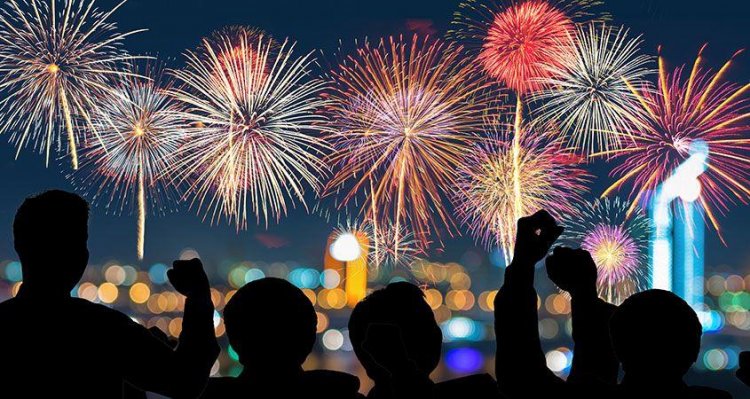Banning of Crackers This Diwali In India

With the continuing potential danger in increase in COVID infections amid the festive period, While India gears up to celebrate the colour of lights Diwali, several states and Union Territories have decided to impose a ban on firecrackers and its sale due to an increase in air pollution and a fear of spike in coronavirus crisis in the country during the winter season.
The National Green Tribunal (NGT) recently imposed a total ban on sale or use of all kinds of firecrackers in the National Capital Region (NCR) from November 9 midnight to November 30 midnight, saying "celebration by crackers is for happiness and not to celebrate deaths and diseases".
The Brihanmumbai Municipal Corporation (BMC) on Monday announced a ban on firecrackers with immediate effect till November 30.
However, the civic body allowed the use of less polluting firecrackers like anar, fuljhari for children within the society premises or outside their house on the evening of November 14.
In the guidelines issued today, the BMC said bursting of firecrackers in any other premises like hotel, club, gymkhana, organisation, commercial premises will not be allowed.
“We have given an exception for November 14 when in the evening time, especially the children under the guidance of parents, can burst firecrackers that are mild in nature,” the guidelines read.
The civic body also assured strict action against violators.
“All the assistant municipal commissioners of 24 administrative wards and local police stations have been asked to implement these guidelines. If anybody will be found violating the norms, then the civic team and police officials can take action against them under epidemic act, 1897 and disaster management act, 2005,” a BMC official said.
Officials said that the decision was taken by the corporation in a larger ‘public interest’, considering the pandemic situation and the firecrackers could trigger health issues among Covid patients. Mumbai Municipal Commissioner I S Chahal said, “Let us strive to have a cracker-free Deepawali festival this year to save our great city of Mumbai from a possible second wave of Covid.”
The corporation has instructed citizens not to use sanitizers while lighting diyas or bursting firecrackers as it is flammable in nature and could cause accidents. “To avoid any possible accidents due to sanitizers, citizens can use soap for washing their hands.
The BMC has also requested citizens to use online mediums to exchange greetings rather than physically visiting at each other’s houses.
Delhi
The Delhi government had last week imposed a complete ban on the sale and bursting of all types of firecrackers from November 7 to November 30. Delhi Environment Minister Gopal Rai said that if anyone violates the ban on firecrackers during Diwali, then the violator shall be penalized under the Air Act.
West Bengal
Anybody found violating the Calcutta High Court's order banning the use and sale of firecrackers in West Bengal during Diwali, Kali Puja, Chhath and Kartik Puja to curb pollution amid the Covid-19 pandemic, will attract strict actions including six months' jail term. "Anyone found violating the court order will be dealt with strictly. The person will face action as per the law. It can be a six-month jail term," the official said, PTI reported.
Odisha
The Odisha government has banned the sale and use of firecrackers across the state during the festive season to check air pollution which can aggravate health conditions of COVID-19 patients. The period of the ban is from November 10 to 30, according to a government order.
Haryana
The Manohar Lal Khattar government in Haryana allowed bursting firecrackers for two hours on Diwali. This decision has been taken in view of the rising levels of pollution while adhering to the guidelines issued by the National Green Tribunal (NGT) to decrease air pollution.
Karnataka
The sale and bursting of 'green crackers', as per Supreme Court guidelines, will be allowed during Diwali, the Karnataka government said. Chief Minister B S Yediyurappa had appealed to the people to celebrate the festival in a simple way by using only green crackers.
Rajasthan
Chief Minister of Rajasthan, Ashok Gehlot announced the ban on the sale and burning of firecrackers ahead of all states. On November 2, CM Gehlot tweeted, "State govt has taken the decision to ban the sale and bursting of firecrackers to protect the health of Covid-19 infected patients & public from poisonous smoke emanating due to fireworks. In this challenging corona pandemic time, protecting the lives of people is paramount for govt."
Sikkim
The Sikkim government has imposed a complete ban on firecrackers throughout the state until further notice is given.
Chandigarh
The Union Territory of Chandigarh has also issued a ban on selling and bursting of firecrackers of all types with immediate effect.
There is believed to be a relation between air pollution and the severity and magnitude of COVID infections.
A Harvard University study shows that an increase of only one microgram per cubic meter in PM 2.5 - dangerous tiny pollutants in the air - is associated with an 8% increase in the Covid-19 death rate. Another study by scientists at the UK's University of Cambridge also found a link between the severity of Covid-19 infection and long-term exposure to air pollutants, including nitrogen oxides and ground-level ozone from car exhaust fumes or burning of fossil fuels.
"Such pollutants can also cause a persistent inflammatory response and increase the risk of infection by viruses that target the respiratory tract," Marco Travaglio, one of the co-authors of the study, told the BBC.
PM2.5 levels in Delhi have averaged around 180-300 micrograms per cubic meter in recent weeks - 12 times higher than the WHO's safe limits.
This is a depressing reversal. Delhi residents were able to breathe clean air for most of the year because a stringent lockdown brought industries and traffic to a grinding halt.
There have been no studies in India yet to examine the effect of air pollution on Covid-19 infection or recovery rates. But doctors and epidemiologists have long warned that toxic air will only hamper India's fight against the virus.
The country now has the world's second-highest caseload (7.5m and counting) and the third-highest death toll (more than 114,000) from the virus, although deaths per million of the population are relatively low.
But experts say worsening air quality will likely increase these numbers.
Delhi, already one of the cities worst-hit by the pandemic, will probably bear the brunt because its residents have been exposed to hazardous levels of pollution for years.
The Harvard study surveyed more than 3,000 counties across the US but the results are alarming for Delhi as well given its terrifying air pollution records - it has consistently ranked among the world's most polluted cities.
"The study arrived at the conclusion even after taking many confounding factors such as population density and socioeconomic variables into account," Dr Dominici said.
The researchers concluded that there was an urgent need to control air pollution in areas which are badly hit by Covid-19.
This major decision to ban firecrackers is due to the rising pollution and the potential pollution from the crackers which increases the risk of COVID-19 patients. The air pollution in India as the winter sets in has been a matter of concern especially in the national capital and its surrounding areas.















































